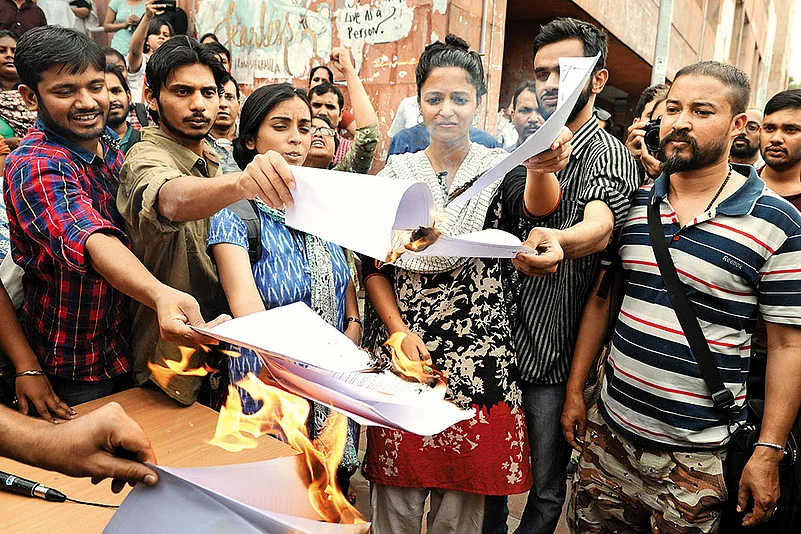A April-May is exam time at JNU and students have been busy preparing for their holidays. But just as the dust kicked up by the arrest of several students on sedition charges in February seemed to be settling, the Vice-Chancellor rolled out the list of punishments.
While the JNU administration had maintained that the “high-level inquiry” was concerned with acts of indiscipline and not with charges of sedition, there were penalties for raising ‘objectionable slogans’ and attending the February 9 event where ‘objectionable posters’ were put up, indicating the university’s clear stand on the charge of anti-nationalism. Fines, suspensions, rustication for five years....
Given that the matter has far surpassed the university’s bounds, could it have waited for the police to complete investigation and allowed a trial court to weigh in first? Could it have gone for conciliation? Students have now started an indefinite hunger strike. Or were there reasons for meting out seemingly arbitrary punishments?
Outlook spoke to four of the five members of the high-level committee. None of them confirmed if the punishments meted out were recommended by them, choosing to fob it off to the V-C. “We did recommend punishments but I don’t know what punishments the V-C finally decided,” said Rakesh Bhatnagar, chairperson of the committee, the day after. “We awarded punishment according to the rules of JNU but discretion lies with the V-C,” said G.J.V. Prasad. (The V-C Jagdish Kumar refused to speak to Outlook despite four attempts at securing an appointment).
But the orders sent to students have no such ambiguity. They all end with “This has the approval of the V-C”. They also quote from the ‘Rules of discipline and proper conduct of students ’, one clause which gives the V-C a long reign, where students are prohibited from engaging in “any other act which may be considered by the V-C or any other competent authority to be an act of violation of discipline and conduct.” This section has been applied to Umar Khalid, Anirban Bhattacharya, Rama Naga, Mujeeb Gattoo, Ashutosh, Chintu Kumari and Shweta Raj.
Students feel that the punishments are arbitrary. Guilty of the same offences, some have been punished Rs 10,000 and other up to Rs 20,000. Some have been suspended for one semester and others for two. They have also been innovative in the punishment meted out to Anirban, who has been given a punishment which doesn’t exist in the JNU statute—he has been rusticated till July 15, after which he is not rusticated for 10 days, but then barred from the campus for five years. Umar Khalid has been found guilty of the exact same charges as Anirban but has been given a rustication for one semester and a fine of Rs 20,000. A senior administrator says that the V-C concurred with the HLEC’s recommended punishments.
The students have overwhelmingly opposed the committee from the beginning and rejected its findings; now they see these punishments as further example of its lack of credibility. The student union feels that the university timed the punishments so that they happen at the end of the year, even though the committee’s report was submitted on March 11 (after extensions). They feel this was to ensure student strength would be at its weakest, with many busy with exams or holidaying. They also feel the lack of uniformity in punishments is a ploy to divide the students, making some feel like they should move out of the movement. The administrator says the delay was because they had other matters to deal with and some important staff were on leave. But there has also been criticism on the grounds that the committee is not representative, although eventually, the university got two more members, including the only female member.
Students question the role of the chairperson, Rakesh Bhatnagar, who they point out has been a part of the ‘Youth For Equality’ movement, which was set up to oppose OBC reservation in universities. Dr Kaushal Mishra, president of the organisation, says that Bhatnagar is a sympathiser and has given talks on the issue at their events. One website lists Bhatnagar’s contact details for anyone who wants to donate money to the JNU chapter of the organisation, something which Mishra denies. Bhatnagar hung up twice when asked about this.

Students also note the irony of them being accused of “arousing communal, caste or regional feeling” because their poster said they are “against the Brahminical collective conscience!” “How is it castesist to oppose the casteism of Brahminism?” asks Anirban. In fact, the only pattern they do see is that the punishments are similar to what happened with Rohith and others at HCU. There too students were turned out of their hostels. Here nearly all the orders said that the students would be evicted if they didn’t pay fines. “By their yardstick, Rohith was also communal and casteist because he opposed Brahminical hegemony and criticised the Muzaffarnagar riots,” says Anirban. “We are going to fight this politically to ensure social justice. We will be pushing for a Rohith Act to be written,” joins in Shehla Rashid.
The protesting students have always maintained that academic and student issues are their equal priority. In the orders, the chief proctor has written to all students saying pointedly that the V-C “has taken a somewhat lenient view of the matter,” keeping their “career prospects in mind.”
Anirban’s rustication is suspended for 10 days, during which time he can presumably submit his PhD on plantation labour in north Bengal. But as he cannot visit the campus for five years, a viva seems impossible. “How is this leniency on their part?” he asks. Umar, who is in the sixth semester of PhD, says “I was due to travel for my field work to Patna, Calcutta and Ranchi, in the coming semester. First of all my bail order does not permit this. Secondly, we have been getting threats and have asked the V-C to ensure security but they have not done anything. It’s clear that this administration’s priorities are not the students or academics. They are not accountable to the students.”
Strangely, ABVP is also opposing the punishments and is fasting alongside the union members. This is because their own leader Saurabh Kumar Sharma has also been fined a hefty Rs 10,000. It is for lying down in front of a bus to stop it from leaving the campus on Feb 9. “Only our freedom of expression is being curbed. This is because JNUTA has influenced the committee. This is too lenient on them. Why has Anirban been allowed time to submit his PhD?” asks Shruti Agnihotri, an ABVP member.
The JNUTA, on their part, had consistently rejected the committee, even burning its report on campus. The students are defiant—that much is for sure. It is clear that their opposition will continue and the hunger strike confirms the force of the stance. “As a student, this is hard for us to deal with. But as an activist, this is my challenge to oppose this,” says Umar.


















.jpg?w=200&auto=format%2Ccompress&fit=max)







